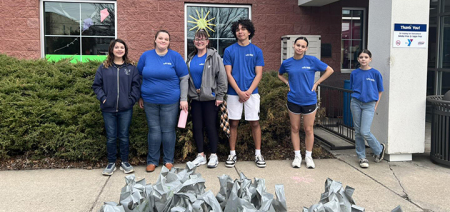Our Newspaper Is Part Of The Community
Published:
April 17th, 2019
By:
Joe Angelino
Imagine yourself not physically well. This illness has gone on for some time, progressively getting worse. One morning you wake up completely blind. You are nearly helpless without your sight. Now, dependent upon others, you can only listen to what they tell you to learn what is happening in your community and your world.
Now, use that blindness analogy to imagine life without our hometown newspaper. Without a daily paper, you’d still hear about the major crimes or fatal accidents in the area, and certainly, juicy gossip would spread like wildfire. The problem is depending upon who you are listening to would determine just how slanted is their version of the event.
Without a local paper, you would probably turn to the internet to get news stories about state, national and international headlines, if you can trust the sources. However, to actually find and read local news would be difficult. Facebook has groups which pass around local scoop, but how much of that would be rumors and blurry photos? While many good discussions take place on public internet forums, you still have to endure the comments from the peanut gallery while engaging the serious thinkers.
It is no secret newspapers, not specifically this one, but all the printed news media is sailing into uncharted waters, and some outlets are sinking. The reason for this is two-fold; readers are getting their news from glass screens reading the digital events of the day. Ironically, many of those same online articles have their origins from a story found or quoted from a newspaper. Another reason is advertisers are moving their money to other marketing platforms to reach customers.
A business owner in any Chenango County town can and probably does use popular internet-based social media to project their message out at no cost. Remember, you get what you pay for and popular doesn’t always mean it is recommended. Once posted to social media, the information needs monitoring to make sure the reputation of your business isn’t slandered by a past unhappy customer.
A few months ago, December 21, 2018, the Sayre, PA-based River Valley News Group ceased publishing The Tri-Town News (Sidney, Bainbridge, Afton), the Chenango American (Greene), The Oxford Review-Times and the Whitney Point Reporter. People in those towns are now at a loss to receive local news. The businesses in those towns can no longer get their targeted advertising out to their neighbors in a reasonable way.
A newspaper – this newspaper – is as much a part of the community as the high school, the fire department or the hospital. The absence of any of these institutions would cause a void in all of our quality of life. All of these organizations are only as strong as the support received from the community. Where else would any of us go for information about local government happenings, business, and non-profit initiatives, obituaries and the always popular high school sports? And while mentioning sports, the importance of clipping news print for a scrapbook can’t be understated.
When the news is printed in this paper, there is a name that at the top of the article which tells who wrote the story. Having an author’s name attached lets you know the reporter talked to the principal people involved, looked at source documents and gathered facts. These reporters talk to many people, some who are public servants who really prefer not to answer questions in difficult conditions hoping a situation will “just go away.” Good government requires an overseer, especially one enshrined in the First Amendment of our Constitution.
By having people you know, working in a building on Lackawanna Avenue in Norwich, publishing reports, readers are assured there is no ‘fake news’ distributed. This guarantee has its roots in reporters forming relationships with local people, which if faked, would dissolve.
Only a few people want to be quoted in the news, and fewer still want an unflattering article composed about their business, organization or themselves. I’ve been in the crosshairs of this very paper while trying to explain a decision or the actions of an officer when I was police chief, and it wasn’t pleasant. But I recognized the importance and value of getting information – correct information – out to the masses in an efficient way.
What this all boils down to is the value of a hometown daily newspaper. Readers, known as subscribers, play a large role in the success of any newspaper. Another key to publishing a paper is advertising revenue. When considering the demographics in Chenango County, the daily paper is still a good return on investment for a retail business or a classified ad.
Even though it’s a business, our newspaper is part of the community. I have no magic ball to predict the future of The Evening Sun. I believe the need for local news will never go away. How publishers bring that news to the masses, while generating revenue, is above my scope of business acumen. I do know, nearly every important conversation about local issues revolves around “that article that was in the paper.”
Author: Joe Angelino - More From This Author
Comments









